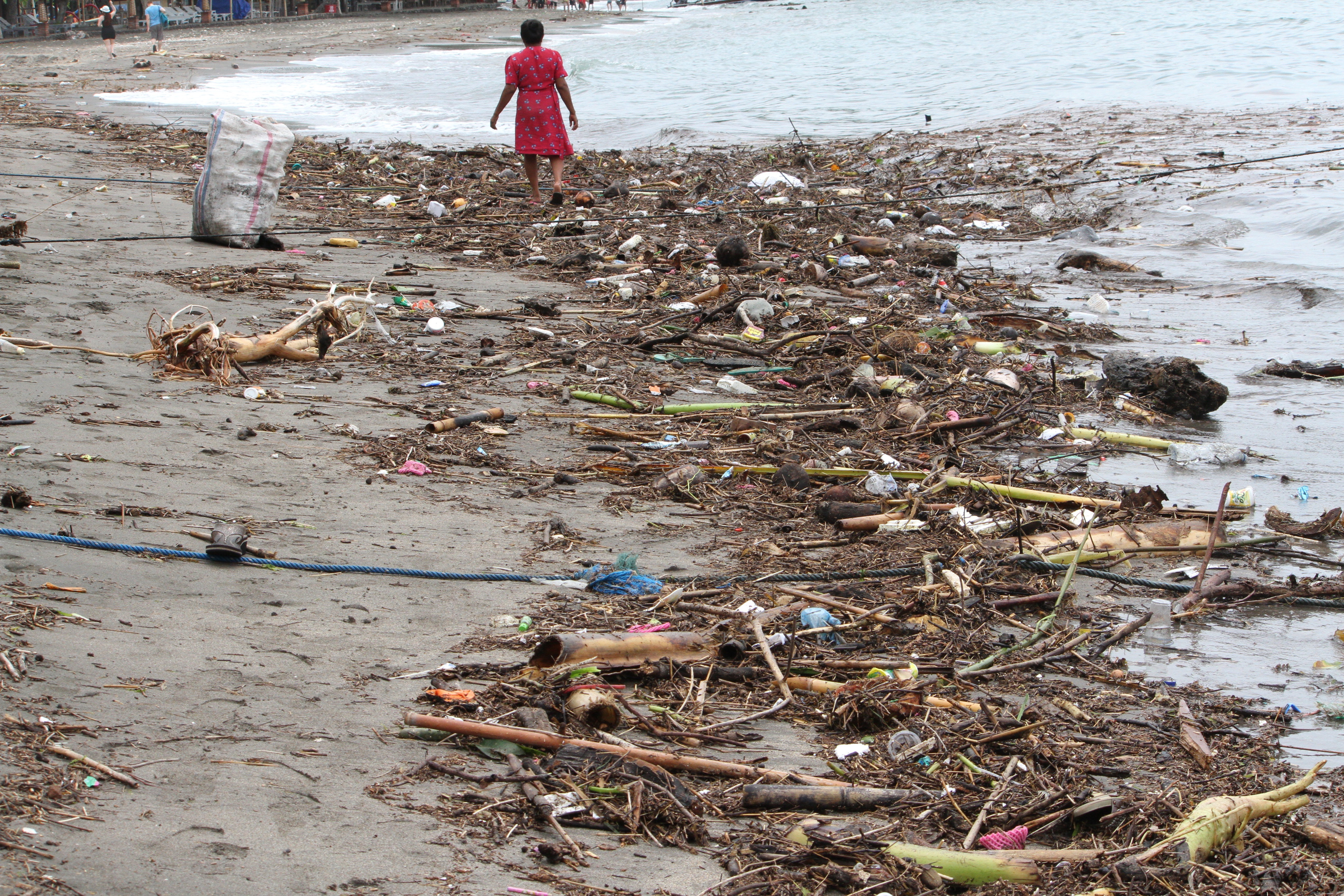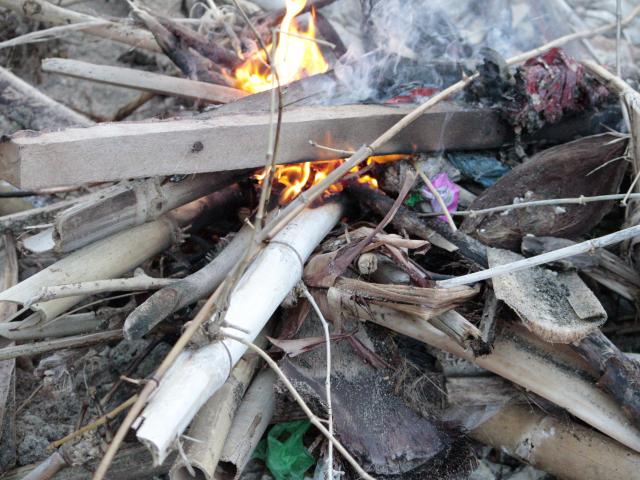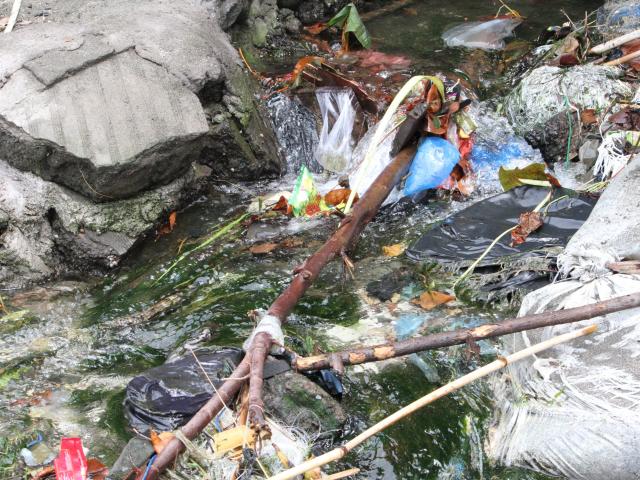
Without change, plastic could smother paradise, writes Gina Dempster.
I’ve just returned from a whole month in Bali, enjoying the warm days and warm welcome of the lovely Balinese people. It ticked the box for the perfect island holiday: cocktails, palm trees, waves, delicious food (that I didn’t have to cook). But then there was the rubbish!
I knew there would be plastic on the beaches, and I thought I was ready for it. But I don’t think you could ever be ready for the phenomenal quantity of plastic debris washed up on the beaches and floating in the water. Plastic bags, bottles and even dirty nappies stranded on the sand as far as you could see. As you snorkel among beautiful tropical fish, there are plastic bags, disposable plastic cups and strips of plastic floating on the surface and caught in the coral.
What I didn’t know before I went was that Bali has a massive rubbish problem, and, unfortunately, arriving at the end of the wet season, I was there to witness it at its worst. Along every road are deep gutters that fill up with plastic rubbish, which is washed down to the sea when it rains. Stream and river banks are used as informal rubbish dumps, meaning more rubbish headed for the sea.

The plastic plague is widespread through the islands of Indonesia. A report published in Science journal in 2015 found that Indonesia was the second-biggest polluter of plastics into the sea after China. The report said that 83% of waste in Indonesia is mismanaged.
In most of the smaller coastal towns we visited, people told me there was no official rubbish collection and it was up to them to deal with it. Most people buried it themselves or burned it. Local environmental organisations estimate that up to six Olympic swimming pools of rubbish are dumped by the roadside or in illegal tips every day.
While the quantity of plastic on the beaches was mind-boggling, people were trying to clear it up outside the big tourists hotels. Driftwood and plastic were raked together into piles, and set on fire. Burning plastic does make the visual pollution go away, but it also releases really nasty pollutants. According the US Environmental Protection Agency, among them are highly toxic dioxins that can settle on crops and in the waterways and will be concentrated in the food chain.
I’ve heard tourists blaming the locals for dumping rubbish but as tourists, surely we’re the biggest part of the problem. Bali is welcoming an incredible 12 million tourists a year (four million from overseas and eight million from Indonesia) to an island of just over four million residents.
With them come a plague of disposable plastic. The truly scary thing is that the tidal wave of plastic rubbish is happening globally. But in our country, it’s whisked away to landfills and recycling depots without us ever really seeing the scale of the problem.

In the not so distant past, any food packaging in Bali was made from banana leaves that would break down where it fell. Neither the waste infrastructure nor people’s behaviours have adapted to the new reality of disposable plastic.
And the problem is self-perpetuating, because when litter is so visible, it’s like a permit to litter more. A famous littering study done by Robert Cialdini, emeritus professor of psychology and marketing at Arizona State University, shows that humans are much more likely to litter in a place that already has a lot of rubbish lying around.
He concluded that social norms and expectations determine whether we litter or not.
That and having some better way to dispose of rubbish. Without an island-wide collection system for rubbish and recycling, the local people are stuck between a rock and a hard place. How can a population of 4 million, many on extremely low incomes, fund a functioning waste system which can deal with the flood of plastic?
The only way I can imagine that happening is through a financial contribution from tourists and/or the companies that use the packaging. Introducing a container deposit system, which gives cash back when beverage containers are recycled, would be a great place to start reducing litter and funding a waste collection system.
The Balinese are fighting back against plastic pollution. Local groups are working hard to raise awareness of the problem, clean up beaches and reduce the influx of plastic at source. Most well known are two young sisters from Ubud, who have campaigned for three years to ban plastic bags in Bali.
Frustrated by the lack of island-wide action, Melati and Isabel Wijsen finally went on a modified hunger strike and succeeded in getting a meeting with the governor of Bali. He has made a commitment to the sisters and their Bye Bye Plastic Bags campaign that Bali will go plastic bag-free by 2018. Their campaign is now focusing on education around marine debris and helping youth in other nations to start their own branches.
Banning plastic bags would make a huge impact, especially as so much of the plastic you see floating in the water is plastic bags. But there is a lot of education work that needs to be done in tandem. As a tourist, you want to help, but it’s hard to know what difference you can make.
For a while I thought maybe the best thing tourists could do is to stay away, but that’s not going to create any kind of solution or positive change.
I’d be interested to hear what others think, but the best I can come up with is to talk openly about the problem, both at home and in Bali, and support local efforts to clean up the plastic plague.
Impose a tourist tax on yourself by making a donation to one of the organisations on the ground. Follow them on social media and share with your networks. The more people who notice and care, the more likely that Bali’s plastic bag ban will go ahead next year and the tap of plastic pollution will start to be turned off.
What can you do?
Visiting Bali and don’t want to add to the plastic pollution?
• Take your own refillable drink bottle. Choose hotels and guest houses that provide refill water. Ubud has some public water stations.
• Take your own shopping bag: Envirosax are great travel bags as they roll into a tiny space.
• Say no to straws or buy some bamboo ones to carry and reuse.
• Give positive feedback on waste reduction efforts: e.g., shops charging for plastic bags, providing refill water.
• Mention waste-minimisation efforts on booking sites, e.g., Trip Advisor, Booking.com. These sites have a lot of influence on accommodation providers and travellers.
• Pick up plastic (it seems never-ending but your actions might help create a new social norm).
• Donate to local organisations taking action: www.byebyeplasticbags.org or rolefoundation.org
- Gina Dempster is communications officer at Wanaka Wastebusters. Each week in this column, one of a panel of writers addresses issues of sustainability.












